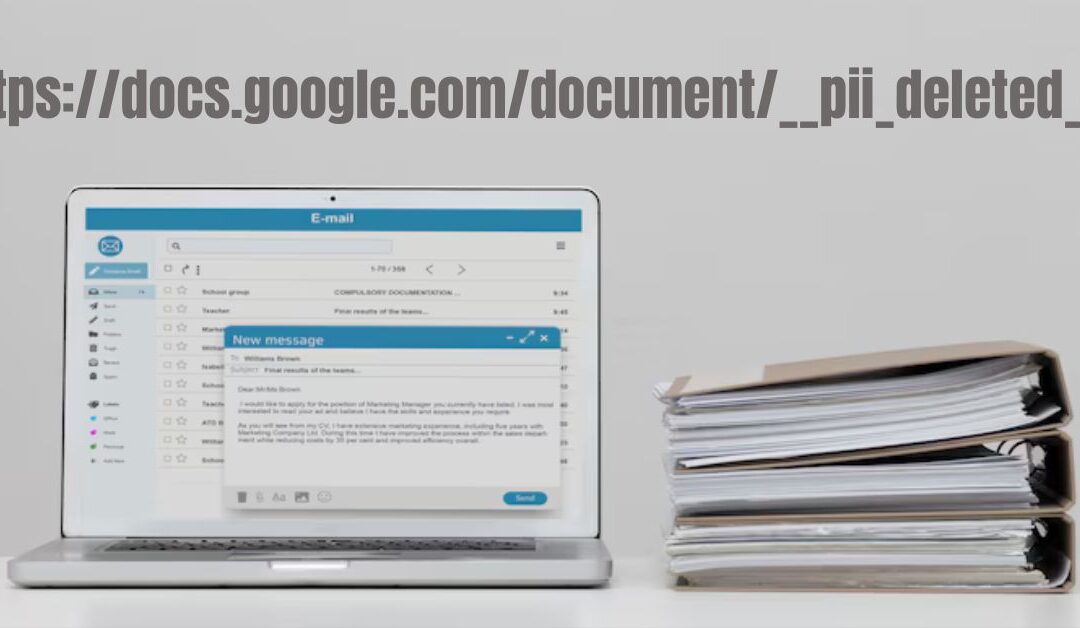In today’s digital age, protecting your personal information is more critical than ever. With just a few clicks, sensitive data can become public knowledge, exposing you to potential identity theft and privacy breaches. One of the most significant threats comes from Personal Identifiable Information (https://docs.google.com/document/__pii_deleted__) showing up in search results on platforms like Google. Whether it’s your name, phone number, or home address, having this information accessible online can lead to dire consequences.
The Importance of Protecting PII
Personal Identifiable Information (ttps://docs.google.com/document/__pii_deleted__) holds significant value. It includes details like your name, address, phone number, and social security number. When this information falls into the wrong hands, it can lead to identity theft and financial fraud.
The rise of digital platforms means our ttps://docs.google.com/document/__pii_deleted__ is more exposed than ever. Cybercriminals actively search for vulnerabilities in online systems. Once they acquire your information, they can wreak havoc on your life.
Protecting PII isn’t just about personal safety; it’s also crucial for maintaining trust with friends and family. Breaches can affect relationships when sensitive data becomes public or misused.
Additionally, businesses that fail to safeguard customer PII risk severe legal repercussions and loss of reputation. Taking steps to protect this information serves as a proactive measure against potential threats in today’s interconnected world.
How PII Can End Up on Google Search
Personal Identifiable Information, or ttps://docs.google.com/document/__pii_deleted__, can inadvertently appear on Google Search through various channels. One common way is through data breaches. When companies experience security failures, sensitive customer information may leak online.
Social media platforms also play a significant role. Users often share personal details without realizing the potential risks. Posts containing names, locations, and even phone numbers can end up indexed by search engines.
Steps to Remove PII from Google Search
Removing ttps://docs.google.com/document/__pii_deleted__ from Google Search can feel daunting, but it’s manageable with a clear strategy. Start by identifying the specific information you want to remove. This could include your name, address, phone number, or any other sensitive details.
Next, use Google’s removal tool. Visit the Google Search Console and submit a request to have your personal data removed from search results. Provide as much detail as possible for quicker processing.
If PII appears on third-party sites, reach out directly to those websites. Most reputable platforms have processes in place for such requests.
Monitor your digital footprint regularly using tools that alert you when new instances of your ttps://docs.google.com/document/__pii_deleted__ appear online.
Consider bolstering privacy settings on social media accounts and reviewing what you share publicly moving forward.
Additional Tips for Protecting Your PII Online
Staying vigilant online is crucial for protecting your personal identifiable information. First, consider using strong, unique passwords for each account. A password manager can help you keep track of them securely.
Enable two-factor authentication whenever possible. This adds an extra layer of security beyond just a password.
Be cautious about the information you share on social media. Review privacy settings frequently and limit what others can see.
Regularly check your credit report and opt out of data broker services that sell your information to third parties.
Use secure connections by ensuring websites are ttps://docs.google.com/document/__pii_deleted__ before entering any sensitive details.
Stay informed about the latest cybersecurity threats and tactics used by hackers to exploit PII vulnerabilities. Awareness is key in today’s digital landscape.
What is PII and why is it important to remove it from Google Search?
Personal Identifiable Information (PII) encompasses any data that can be used to identify an individual. This includes names, addresses, phone numbers, and social security numbers. Essentially, if someone can use the information to pinpoint who you are or where you live, it qualifies as ttps://docs.google.com/document/__pii_deleted__.
Having your PII accessible on Google Search poses significant risks. Cybercriminals often exploit this information for identity theft or fraud. When sensitive details fall into the wrong hands, the consequences can be devastating.
Removing PII from search results not only protects your privacy but also grants peace of mind. The longer this information lingers online, the greater the chance it gets misused. Taking action means safeguarding your identity in a digital world that’s increasingly vulnerable to attacks and breaches.
Step-by-Step Guide to Remove PII from Google Search
To begin the process of removing PII from Google Search, start by identifying what personal information is visible. Search your name and any other details that may be linked to you online.
Once you’ve gathered this information, document each instance where it appears. This list will guide you in the removal process.
Next, visit Google’s Remove Outdated Content tool. Input the URLs containing your ttps://docs.google.com/document/__pii_deleted__ and request their removal. Be clear about what specific details need to go.
For sites that won’t comply directly through Google’s tools, reach out to them via their contact forms or customer support channels. Politely ask for assistance in removing your data.
Regularly monitor search results after submitting requests. Persistence is key; follow up as necessary until your information has been adequately addressed.
The Consequences of Leaving PII on Google Search
Leaving personal identifiable information (ttps://docs.google.com/document/__pii_deleted__) on Google Search can lead to serious repercussions. Identity theft is one of the most alarming risks individuals face. Criminals can exploit easily accessible details, creating accounts or making purchases under someone else’s name.
Moreover, privacy breaches extend beyond financial harm. Unwanted attention or harassment becomes a real possibility when personal data is publicized online. This could include phone numbers, home addresses, and even photographs.
Employers often conduct online searches before hiring candidates. Finding sensitive information can tarnish reputations and diminish job prospects significantly.
Additionally, some malicious actors may use ttps://docs.google.com/document/__pii_deleted__ for phishing scams or social engineering attacks. They might manipulate trust by posing as legitimate organizations to extract more sensitive information from their victims.
In this digital age, safeguarding your PII is not just prudent; it’s essential for maintaining control over your personal life and well-being.
Conclusion
Protecting your Personal Identifiable Information (PII) is crucial in today’s digital landscape. The risks associated with leaving PII exposed can lead to identity theft, scams, and other serious consequences that affect both individuals and their families.
Taking proactive steps to remove any ttps://docs.google.com/document/__pii_deleted__ from Google Search not only safeguards your privacy but also gives you greater control over your online presence. Understanding how PII ends up on search engines empowers you to take action effectively.


